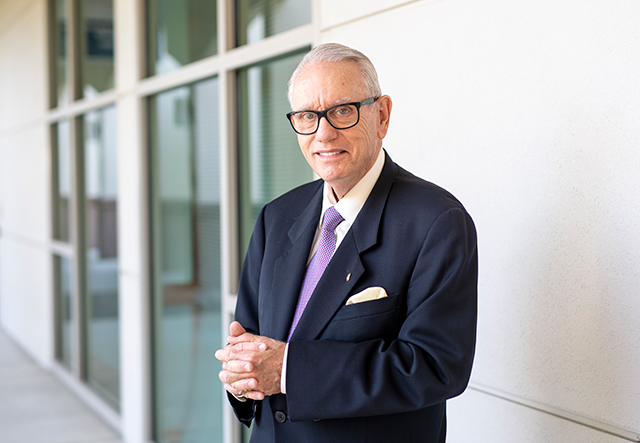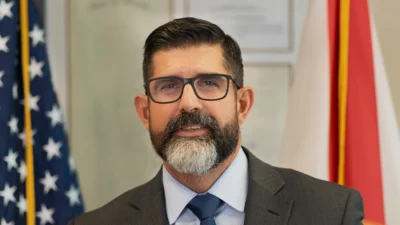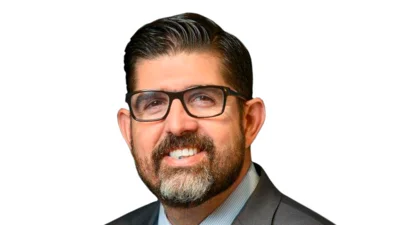Florida Gulf Coast University issued the following announcement on August 19.
Ed Staros brings wisdom of 48 years in industry to role as school’s executive-in-residence
By Drew Sterwald
Contributors: Photo by James Greco
On the first day of fourth grade, young Ed Staros and his classmates were assigned to write an essay either about their summer vacation or what they wanted to be when they grew up. He chose the latter. His career goal already was set in his mind — and was unusually specific and ambitious for someone that age: hotelier.
Staros recently retired after 48 years in the upper echelons of that industry — 37 of them as a Ritz-Carlton executive — and now he’s aimed his laser-sharp focus on helping FGCU’s resort and hospitality administration program complete its transition to the Lutgert College of Business. As an executive-in-residence since September 2020, he’s been promoting the benefits of the additional required courses in economics, finance, accounting, supply-chain management and other subjects that will prepare graduates to excel in business settings other than hospitality. Additionally, he’s been mentoring students and guest lecturing in classes.
As Catherine Curtis, director of the School of Resort & Hospitality Management puts it, “We actually have an industry legend with us.”

“Every day, when you walk in the door, commit yourself to doing a better job than you did the previous day and you’ll always succeed. That’s why I’m here, trying to instill that mindset into the students at FGCU,” says Ed Staros, who’s been serving as an executive-in-residence in the School of Resort & Hospitality Management.
“There couldn’t be a better time for FGCU to be converting this to the business school than today. A business degree really should be the standard in any hospitality program,” Staros says. “If you have a business degree, you can go into finance, risk management, insurance, real estate — all these different directions.”
The longtime vice president and managing director of two Ritz-Carlton properties in Naples, Staros was actively involved with the development of FGCU’s hospitality program from the beginning and still serves on advisory boards in the school and in Lutgert College. Many an Eagle undergraduate has gotten a foot in the elite suite of higher-end hospitality thanks to his long-term relationship with the university.
One of the six founders of The Ritz-Carlton Hotel Co., the Florida State University graduate opened multiple properties around the world. His efforts to help the luxury brand codify quality-management systems were recognized when the company twice won coveted Malcolm S. Baldridge awards. Hotels magazine named Staros its 2019 Independent Hotelier of the World, an honor he has compared to winning the Super Bowl of hospitality.
The wisdom 71-year-old Staros earned along the way to managing a Forbes Five-Star/AAA Five Diamond resort with a $42 million payroll and 1,300 employees is now benefiting Eagles with eyes on a stellar career like his. But he’s not just selling students on the added value of the business acumen they’ll acquire with coursework in Lutgert College. He shares with them a “go-for-the-gold” mindset that helped shape the high standards The Ritz-Carlton represents, a mentality that was also deeply influenced by Steven Covey’s “Seven Habits of Highly Effective People.” The bestseller changed his life at 40, he says, and he frequently gifts the book to promising employees/students as well as mentees.
“What is the hospitality business? It’s a business of product and service and doing it right,” Staros says. “You want your product and your service to be a ‘wow’ every day. You can’t live on your laurels — that’s the day you start failing. Every day, when you walk in the door, commit yourself to doing a better job than you did the previous day and you’ll always succeed. That’s why I’m here, trying to instill that mindset into the students at FGCU.”
Staros’ executive-in-residence role grew out of a conversation with Lutgert College Dean Chris Westley and will continue through the end of fall semester.
Having benefited himself from mentoring early in his career, he enjoys the opportunity to pay it forward with FGCU students. Staros encourages them to think critically about the level of hospitality they want to intern at and ultimately work in — such as a small, boutique motel versus a high-end, full-service resort.
“If you intern at a five-star hotel, which may or may not be your goal, you will at least understand the full spectrum of hospitality much better than if you get an internship at a limited-service hotel,” he says. “Work for the best, and you’ll open your eyes to how complex everything is. That will help you find your place in this wonderful world of hospitality.”
Spring graduate Alexis Wenkstern is now finding her place in that world, thanks in part to seeking out Staros’ guidance, gaining real-world experience at The Ritz-Carlton, Naples and, yes, reading the copy of “Seven Habits” Staros gave her. She even wrote a report on it for him.
“Reading that book set the foundation for my career, enabled me to think and act in a way that prepared me to eventually work at The Ritz-Carlton, Naples,” she says. “Mr. Staros showed that he believed in me by many acts of kindness and helped me to grow my confidence as a person and in the industry. I could not believe that such a celebrity in the hospitality industry saw something in me and wanted to help guide my career. It was obvious he was there for the students.”
As a result, Wenkstern graduated with all the tools she needs to succeed wherever she goes, she says.
“Coaching and mentoring is what I was meant for,” explains Staros. “I could do this the rest of my life.”
His own first role model and career inspiration was his father, Edward P. Staros, who oversaw hospitality concessions at the storied public beaches of Long Island, New York. Staros grew up witnessing the Greek patriarch’s hard work and high standards. Young Ed lent a hand in the family business by rolling coins from the concessions at the family dining room table.
But most significantly, the youngster savored tagging along on dad’s business lunches at luxury Manhattan landmarks like the Plaza Hotel and the Waldorf Astoria. He tasted the good life — fine dining and high-class hospitality — and liked it.
“I thought my father had best job in the world. Everybody he was serving was happy and all the people serving as employees of his were happy,” Staros recalls. “But it was the lunches at The Plaza that really turned me on to wanting to be a hotelier. My father always entertained in a big way. We went to glorious places.”
With the work ethic inspired by his father, it’s no wonder Staros was on duty until the clock struck midnight last New Year’s Eve, his last day at The Ritz-Carlton. Occupancy was 100%. It wouldn’t have occurred to this host with the most to cut out early on his last day. After two decades at the helm, he had personal relationship with all his employees.
“Employees come first and foremost,” Staros says. “People say your customer is always first. No way. My customer is my employees. How can I serve the guests of the hotel if the employees are not on board? If employees are not 100%, they’re not going to give the amount of their time to accomplish guest engagement. Five-star leadership requires employee engagement to be at an all-time high each and every day. Making sure guest engagement is 100% every single day is impossible without the employees.”
As The Ritz-Carlton motto he helped shape says, “We are ladies and gentlemen serving ladies and gentlemen.” Words of wisdom that every FGCU resort and hospitality graduate would do well to emulate.
Original source can be found here.




 Alerts Sign-up
Alerts Sign-up